Introduction
Welcome to CancerMonthly.com (hereinafter, “Cancer Monthly” or the “Website” or the “Site”). Cancer Monthly provides you with access to the Site subject to the terms and conditions contained in this User Agreement (the “Agreement’). Please read this Agreement carefully. You may wish to print this page for reference.
The Site is administered by Cancer Monthly from Raleigh, North Carolina in the United States. This Site and its contents (the “Content”) are designed to comply with United States laws and regulations. Access to the Site and the Content may not be legal by certain persons or in certain countries outside of the United States. If you access this Site from outside the United States, you do so at your own risk and are responsible for compliance with the laws of your jurisdiction.
1. Modification of this Agreement
Cancer Monthly reserves the right at its sole discretion to update or modify this Agreement at any time without prior notice. All provisions of this Agreement pertaining to indemnification, disclaimer or warranties, limitation of liability and proprietary rights shall survive the termination of this Agreement for any reason.
2. Your Rights
Unless otherwise specified, we grant you a non-exclusive, non-transferable, limited right to access, use and display this Website and the material provided hereon, for your personal, noncommercial use, provided that you comply fully with the provisions of this Agreement.
3. Privacy and Security
We are committed to protecting your privacy and security. For more information, you should review our Privacy Policy, which is incorporated into this Agreement by reference and is available on the Website. The terms and conditions of Cancer Monthly’s Privacy Policy may be changed by Cancer Monthly at its discretion.
4. CONTENT OF THE SITE IS FOR INFORMATIONAL PURPOSES ONLY AND IS NOT MEDICAL ADVICE
THE CONTENT OF THIS SITE IS PRESENTED IN SUMMARY FORM, IS GENERAL IN NATURE, AND IS PROVIDED FOR INFORMATIONAL PURPOSES ONLY. THE CONTENT OF THIS SITE IS NOT INTENDED, NOR RECOMMENDED AS A SUBSTITUTE FOR PROFESSIONAL MEDICAL ADVICE, TREATMENT ADVICE OR TREATMENT RECOMMENDATIONS. ALL INFORMATION PRESENTED IN CANCER MONTHLY IS STRICTLY INFORMATIONAL IN NATURE, AND IS NOT TO BE CONSTRUED AS A FORM OF COUNSELING, DIAGNOSIS, OR TREATMENT. YOU SHOULD NOT USE ANY OF THE CONTENT ON THIS SITE FOR DIAGNOSING A HEALTH OR FITNESS PROBLEM, CANCER OR ANY OTHER DISEASE. YOU SHOULD NOT USE ANY OF THE CONTENT ON THIS SITE TO TREAT A HEALTH OR FITNESS PROBLEM, CANCER OR ANY OTHER DISEASE. UNDER NO CIRCUMSTANCES SHOULD ANY OF THE CONTENT ON THIS SITE BE USED TO SELECT A CANCER TREATMENT, THERAPY, PROTOCOL, MODALITY OR DRUG WITHOUT CONSULTING WITH A LICENSED HEALTHCARE PROVIDER. CANCER DIAGNOSIS AND TREATMENT SELECTION SHOULD ONLY BE MADE WITH A MEDICAL PROFESSIONAL. THE INFORMATION AND CONTENT ON THIS SITE IS NOT TO BE USED TO REPLACE THE GUIDANCE OF A MEDICAL PROFESSIONAL. IF THE INFORMATION ON THIS SITE LEADS YOU TO A TREATMENT OF INTEREST, THAT INFORMATION SHOULD BE SHARED WITH YOUR PHYSICIAN OR OTHER LICENSED HEALTHCARE PROVIDER.
NEVER DISREGARD MEDICAL ADVICE OR DELAY IN SEEKING MEDICAL ADVICE BECAUSE OF SOMETHING YOU HAVE READ ON THIS SITE. ALWAYS SEEK THE ADVICE OF YOUR PHYSICIAN OR OTHER QUALIFIED HEALTH PROVIDER REGARDING ANY MEDICAL CONDITION OR TREATMENT.
5. Information Presented is Not Complete or Comprehensive
You acknowledge and agree that the Content of this Site is not complete or comprehensive. The information on this Site constitutes summaries of information provided in some articles written in some journals about the results of some cancer treatments. Therefore, the information on this Site should not be relied upon as comprehensive, nor as a presentation of information on all available cancer treatments. Summaries of many cancer treatments are excluded from this Site.
For those treatments where summary information is provided, such information is not comprehensive or complete. Important aspects or information about a particular treatment may be excluded. For more complete information about a particular treatment you should ask your licensed healthcare provider.
The Site provides some information about various drugs. The information provided about a drug is for informational purposes only and is not a substitute for consultation with your health care professional. The information about a specific drug is in no way a recommendation as to the safety, efficacy or appropriateness of any particular drug, regimen, dosing schedule, nor is it in anyway to be considered medical advice. As with any printed reference, the information about a particular drug may become out-of-date over time. New information may have been published and become generally accepted after the information that appears on this Site. Patients should discuss the appropriateness of a particular drug with their physician. The brand name that Cancer Monthly associates with a particular drug is based on FDA information, however, there may be other brand names associated with that drug that the Site does not mention.
The site provides information on Alternative Resources. This information is for general information purposes only and is not a substitute for consultation with your health care professional. Alternative Resources are not FDA approved and therefore if you have an interest in any such modalities you are urged to speak with your licensed healthcare practitioner. Nothing on this website should be construed as Cancer Monthly suggesting that any person should seek, buy, use or otherwise become involved with any modality that is not FDA approved for the treatment of cancer.
6. Information May Not Be Accurate
Cancer Monthly does not guarantee or warrant the accuracy, completeness or comprehensiveness, of any of the materials used, summarized, presented or discussed in the Site. By accessing the Content of this Site you acknowledge and agree that Cancer Monthly summarizes information presented in some scientific and medical journals and that Cancer Monthly is not responsible for any inaccuracies, omissions or errors in these articles. You also acknowledge and agree that no treatment decision should be based on any article or articles printed in one or more medical or scientific journal. Only a physician can prescribe a treatment and no article cited, sourced, or otherwise used by Cancer Monthly should ever be used to make treatment decisions without consulting with your doctor and other medical professionals.
Moreover, while Cancer Monthly makes every effort to ensure that its treatment summaries accurately reflect what has been written in professional medical and scientific journals, there will be occasions where the information summarized by Cancer Monthly is inaccurate or wrong. This is another reason why the Content of the Site should never be used to make a treatment decision and that treatment decisions should only be made in consultation with medical professionals.
You acknowledge that any reliance upon any advice, opinion, statement, or other information displayed or distributed through the Site including is at your sole risk. Cancer Monthly reserves the right, in its sole discretion and without notice, to correct any errors or omissions in any portion of the Site, or to deny access to the Site to anyone at any time.
7. Does Not Provide Health Care and Does Not Collect Health Information
Cancer Monthly does not furnish, bill or receive payment for health care. Cancer Monthly does not engage in providing care, services, or supplies related to the health of an individual. Cancer Monthly does not engage in preventive, diagnostic, rehabilitative, maintenance, or palliative care, and counseling, service, assessment, or procedure with respect to the physical or mental condition, or functional status, of an individual or that affects the structure or function of the body. Cancer Monthly does not engage in the sale or dispensing of a drug, device, equipment, or other item in accordance with a prescription. Cancer Monthly does not collect any health care information. Cancer Monthly does not facilitate the processing of health information from nonstandard format or content into standard format or content or from standard format or content into nonstandard format or content.
8. Ownership of Content
No use should be made of materials on this Site, except as expressly authorized by this Agreement. The Content of this Site and the selection, arrangement and design of the Content is owned by Cancer Monthly and is protected by copyright and other intellectual property laws including the sui generis rights relating to the protection of databases. You may not reproduce, create derivative works from, transmit, sell, distribute modify, copy, reproduce, republish, upload, post, transmit or distribute in any way any Content, in whole or in part, including any code and software.You may not, or in any way exploit the Site or any portion thereof for any public or commercial use without the prior written permission of Cancer Monthly.
9. Copyright and Trademarks
All Content on the Site, including without limitation text, images, software, audio and video clips, and databases are owned or controlled by Cancer Monthly, which retains all right, title, and interest in and to the Content. The Site and Content are protected by the copyright and trademark laws of the United States and other countries, international conventions, and other applicable laws.
You agree not to use any trademarks, service marks, names, logos, or other identifiers of Cancer Monthly or its employees, licensors, independent contractors, or providers without the prior written permission of Cancer Monthly.
10. Links to Other Sites
The Site contains links, references and pointers to other sites on the Internet which may be maintained by third parties. These references and/or links to the Third Party websites are provided for your reference and convenience only, and do not imply any review or endorsement of the material on these Third Party websites or the sites themselves or any association with their operators. The Third Party websites (and any websites to which they link) may contain information about uses of products that have not been approved or cleared by the Food and Drug Administration. Cancer Monthly does not endorse any “off-label” uses. The Third Party websites (and the websites to which they link) may contain information that is inaccurate, incomplete, or outdated. Your access and use of the Third Party websites (and any websites to which they link) is solely at your own risk. Cancer Monthly does not control, and is not responsible for, the availability, accuracy, privacy policy, or currency of such Third Party websites or any information, content, products or services accessible from such Third Party websites.
You should not construe anything on the Site as a promotion or solicitation for any product or for the use of any product that is not authorized by the laws and regulations of the country in which you are located.
11. Indemnification
In the event that any legal action is taken resulting from (i) your use of the Content or Site, including your breach of the terms of this Agreement, or (ii) any Unsolicited Information provided by you, you hereby agree to indemnify, defend and hold harmless Cancer Monthly and its directors, officers, managers, employees, agents, investors or licensors from and against any and all liability and costs incurred by Cancer Monthly, its directors, officers, managers, employees, agents, investors or licensors in connection with any claim arising out of any breach or alleged breach. You shall cooperate as fully as reasonably required in the defense of any claim. Cancer Monthly reserves the right, at its own expense, to assume the exclusive defense and control of any matter otherwise subject to indemnification without relieving your indemnification obligations and you shall not in any event settle any matter without the written consent of Cancer Monthly.
12. DISCLAIMER OF WARRANTY
EXCEPT AS EXPRESSLY SET FORTH HEREIN, THE SITE (INCLUDING ALL CONTENT, SOFTWARE, FUNCTIONS, FEE-BASED SERVICES, MATERIALS AND INFORMATION MADE AVAILABLE THEREON OR ACCESSED BY MEANS THEREOF) ARE PROVIDED AS IS, WITHOUT WARRANTIES OF ANY KIND, EITHER EXPRESS OR IMPLIED, INCLUDING, BUT NOT LIMITED TO, WARRANTIES OF TITLE OR IMPLIED WARRANTIES OF MERCHANTABILITY, FITNESS FOR A PARTICULAR PURPOSE, COMPATABILITY, SECURITY, ACCURACY, OR NON-INFRINGEMENT. TO THE FULLEST EXTENT PERMISSIBLE BY LAW, CANCER MONTHLY MAKES NO WARRANTIES AND SHALL NOT BE LIABLE FOR THE USE OF THE SITE UNDER ANY CIRCUMSTANCES, INCLUDING BUT NOT LIMITED TO NEGLIGENCE BY CANCER MONTHLY. CANCER MONTHLY DOES NOT WARRANT THAT THE FUNCTIONS CONTAINED IN THE SITE WILL BE UNINTERRUPTED OR ERROR-FREE, THAT DEFECTS WILL BE CORRECTED, THAT THE SITE WILL MEET ANY PARTICULAR CRITERIA OF PERFORMANCE OR QUALITY, OR THAT THE SITE, INCLUDING THE SERVER(S) ON WHICH THE SITE IS OPERATED, ARE FREE OF VIRUSES OR OTHER HARMFUL COMPONENTS.
IN ADDITION, CANCER MONTHLY MAKES NO REPRESENTATIONS OR WARRANTIES AS TO THE ACCURACY OF ANY INFORMATION CONTAINED HEREIN AND EXPRESSLY DISCLAIMS ANY OBLIGATION TO UPDATE SAID INFORMATION. THE SITE AND THE CONTENT ARE PROVIDED ON AN “AS IS,” “AS AVAILABLE” BASIS, WITHOUT WARRANTIES OF ANY KIND. THERE MAY BE DELAYS, OMISSIONS OR INACCURACIES IN THE CONTENT AND THE SITE. CANCER MONTHLY DOES NOT WARRANT THE ACCURACY, COMPLETENESS, TIMELINESS, NON-INFRINGEMENT, TITLE, MERCHANTABILITY OR FITNESS FOR A PARTICULAR PURPOSE OF THE CONTENT OR THE SITE ITSELF, AND WE HEREBY DISCLAIM ANY SUCH EXPRESS OR IMPLIED WARRANTIES.
13. LIMITATION OF LIABILITY
USE OF THE SITE IS AT YOUR OWN RISK. YOU ASSUME FULL RESPONSIBILITY AND RISK OF LOSS RESULTING FROM YOUR DOWNLOADING AND/OR USE OF FILES, INFORMATION, COMMUNICATIONS, CONTENT, OR OTHER MATERIAL (INCLUDING WITHOUT LIMITATION SOFTWARE) ACCESSED THROUGH OR OBTAINED BY MEANS OF THE SITE. UNDER NO CIRCUMSTANCES SHALL CANCER MONTHLY, ITS DIRECTORS, OFFICERS, MANAGERS, EMPLOYEES, AGENTS, INVESTORS OR LICENSORS, OR ANY PROVIDER OF TELECOMMUNICATIONS OR NETWORK SERVICES FOR CANCER MONTHLY, BE LIABLE FOR ANY INDIRECT, PUNITIVE, SPECIAL, OR CONSEQUENTIAL DAMAGES THAT ARE DIRECTLY OR INDIRECTLY RELATED TO THE USE OF, OR THE INABILITY TO USE, THE SITE, EVEN IF CANCER MONTHLY, THEIR RESPECTIVE DIRECTORS, OFFICERS, MANAGERS, EMPLOYEES, AGENTS, INVESTORS OR LICENSORS, OR THEIR PROVIDERS OF TELECOMMUNICATIONS OR NETWORK SERVICES HAS BEEN ADVISED OF THE POSSIBILITY OF SUCH DAMAGES. THIS LIMITATION OF LIABILITY APPLIES TO ALL LOSSES AND DAMAGES OF ANY KIND WHATSOEVER, WHETHER DIRECT OR INDIRECT, GENERAL, SPECIAL, INCIDENTAL, CONSEQUENTIAL, EXEMPLARY OR OTHERWISE. THIS LIMITATION OF LIABILITY APPLIES WHETHER THE ALLEGED LIABILITY IS BASED ON CONTRACT, NEGLIGENCE, TORT, STRICT LIABILITY OR ANY OTHER BASIS. SOME STATES DO NOT ALLOW THE EXCLUSION OR LIMITATION OF INCIDENTAL OR CONSEQUENTIAL DAMAGES, SO THE ABOVE LIMITATION OR EXCLUSION MAY NOT APPLY TO YOU. EVEN IF ANY PART OF THIS LIMITATION OF LIABILITY IS FOUND TO BE INVALID OR UNENFORCEABLE FOR ANY REASON, THEN THE AGGREGATE LIABILITY OF CANCER MONTHLY UNDER SUCH CIRCUMSTANCES SHALL NOT EXCEED, THE COST OF YOUR CURRENT SUBSCRIPTION FOR OUR FEE-BASED PRODUCTS OR ONE HUNDRED ($100.00) DOLLARS IN THE AGGREGATE WHICHEVER IS LESS. IF ANY REMEDY HEREUNDER IS DETERMINED TO HAVE FAILED OF ITS ESSENTIAL PURPOSE, ALL LIMITATIONS OF LIABILITY, DISCLAIMERS AND EXCLUSIONS OF WARRANTIES AND DAMAGES SET FORTH IN THIS AGREEMENT SHALL REMAIN IN EFFECT.
14. General.
This Agreement constitutes the entire agreement between you and Cancer Monthly with respect to the Site and supersedes all prior agreements between you and Cancer Monthly. Failure by Cancer Monthly to enforce any right or provision of this agreement shall not be construed as a waiver of any provision or right. By using this Site, you consent to personal jurisdiction in the federal and state courts located in the State of North Carolina, for any action arising out of or relating to this Site or your use of this Site. Such courts shall have exclusive jurisdiction over all such actions. The United Nations Convention on Contacts for the International Sale of Goods does not apply to this Agreement. In any such action, the prevailing party shall be entitled to recover all legal expenses incurred in connection with the action, including but not limited to its costs, both taxable and non-taxable, and reasonable attorney’s fees.
In the event that any portion of this Agreement is held unenforceable, the unenforceable portion shall be construed in accordance with applicable law as nearly as possible to reflect the original intentions of the parties, and the remainder of the provisions shall remain in full force and effect. All rights not expressly granted herein are hereby reserved.
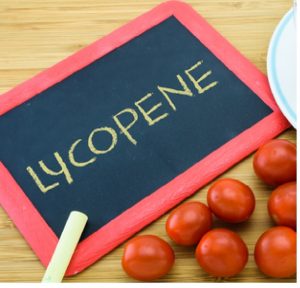 Recent disappointing results in studies of the antioxidant, lycopene, for prostate cancer prevention have made many men question whether it’s still worth loading up on the ketchup and tomato sauce. Although the jury is still out on whether lycopene can protect against prostate cancer, one recent study finds evidence that it might be useful in prostate cancer treatment, potentially slowing down the progression of the disease.
Recent disappointing results in studies of the antioxidant, lycopene, for prostate cancer prevention have made many men question whether it’s still worth loading up on the ketchup and tomato sauce. Although the jury is still out on whether lycopene can protect against prostate cancer, one recent study finds evidence that it might be useful in prostate cancer treatment, potentially slowing down the progression of the disease. 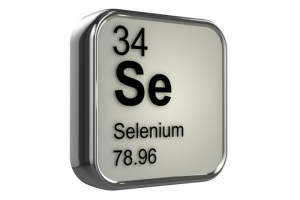 Several studies have indicated that the antioxidant selenium, found naturally in foods like dairy, eggs, and fish, might help reduce the risk of both prostate and colorectal cancers. However, it’s still too early to recommend taking selenium for this purpose because the research is too preliminary, according to a review of studies published online September 2 in Molecular Nutrition and Food Research.
Several studies have indicated that the antioxidant selenium, found naturally in foods like dairy, eggs, and fish, might help reduce the risk of both prostate and colorectal cancers. However, it’s still too early to recommend taking selenium for this purpose because the research is too preliminary, according to a review of studies published online September 2 in Molecular Nutrition and Food Research. The magnolia tree is not just beautiful—it’s also the source of a potentially potent cancer-fighting drug. Researchers at the University of Pittsburgh have discovered that honokiol, a substance extracted from the root and stem bark of one species of magnolia tree, may help treat—or even prevent—prostate cancer.
The magnolia tree is not just beautiful—it’s also the source of a potentially potent cancer-fighting drug. Researchers at the University of Pittsburgh have discovered that honokiol, a substance extracted from the root and stem bark of one species of magnolia tree, may help treat—or even prevent—prostate cancer.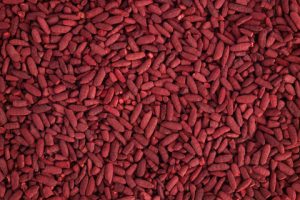 A recent study in the Journal of Medicinal Food finds that red yeast rice can significantly slow the growth of prostate cancer cells. Rice that has been fermented with the red yeast, Monascus purpureus, contains compounds called monacolins, one of which – monacolin K – has the same chemical structure as the cholesterol-lowering drug, lovastatin (Mevacor). In fact, studies have shown that Chinese red yeast rice lowers cholesterol as well as lovastatin.
A recent study in the Journal of Medicinal Food finds that red yeast rice can significantly slow the growth of prostate cancer cells. Rice that has been fermented with the red yeast, Monascus purpureus, contains compounds called monacolins, one of which – monacolin K – has the same chemical structure as the cholesterol-lowering drug, lovastatin (Mevacor). In fact, studies have shown that Chinese red yeast rice lowers cholesterol as well as lovastatin.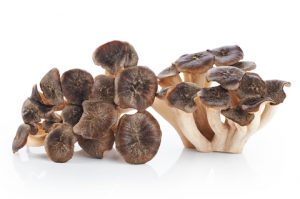 Adding a mushroom extract to interferon therapy for prostate cancer significantly improves the treatment’s effectiveness, and may help reduce both its cost and side effects, according to a study published in the Journal of Hematology and Oncology.
Adding a mushroom extract to interferon therapy for prostate cancer significantly improves the treatment’s effectiveness, and may help reduce both its cost and side effects, according to a study published in the Journal of Hematology and Oncology.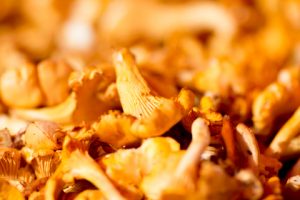 In their quest to find new ways to fight cancer, researchers are increasingly turning to nature. They’re discovering that many of the vegetables we regularly consume in our diet —notably mushrooms—are potent cancer killers. A new study in the journal Nutrition and Cancer finds that the white button mushroom is particularly effective against prostate cancer.
In their quest to find new ways to fight cancer, researchers are increasingly turning to nature. They’re discovering that many of the vegetables we regularly consume in our diet —notably mushrooms—are potent cancer killers. A new study in the journal Nutrition and Cancer finds that the white button mushroom is particularly effective against prostate cancer. Magnolol, a substance taken from the root and bark of the magnolia tree, is a potent killer of prostate cancer cells, according to a study in the Journal of Cellular Biochemistry. Because it does not damage healthy cells, magnolol could be a promising new therapy for prostate cancer, as well as other types of cancers.
Magnolol, a substance taken from the root and bark of the magnolia tree, is a potent killer of prostate cancer cells, according to a study in the Journal of Cellular Biochemistry. Because it does not damage healthy cells, magnolol could be a promising new therapy for prostate cancer, as well as other types of cancers. Men with high levels of vitamin A (retinol) in their blood have a lower risk for aggressive prostate cancer, but simply eating more vitamin A-rich foods may not be enough to reduce a man’s odds of getting the disease, according to a study in the April issue of Cancer Epidemiology Biomarkers & Prevention.
Men with high levels of vitamin A (retinol) in their blood have a lower risk for aggressive prostate cancer, but simply eating more vitamin A-rich foods may not be enough to reduce a man’s odds of getting the disease, according to a study in the April issue of Cancer Epidemiology Biomarkers & Prevention.